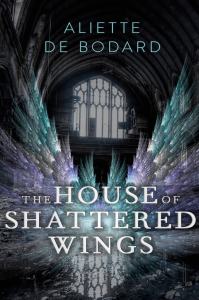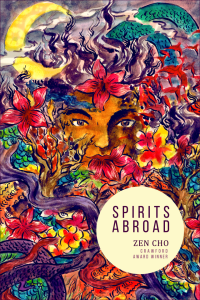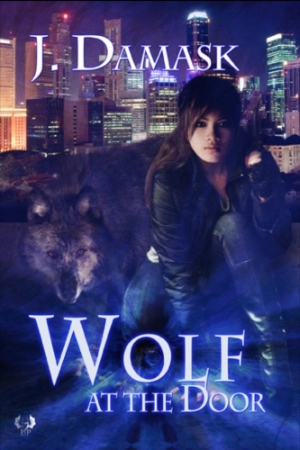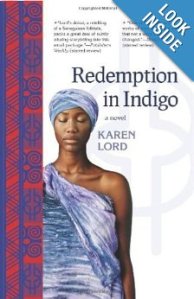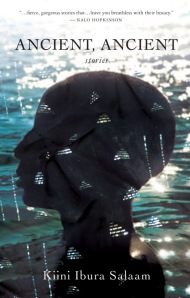A murder mystery set in a ruined Paris under the rule of Fallen angels, The House of Shattered wings is the first the Dominion of the Fallen series. Sweeping and evocative, Aliette de Bodard’s skill as a writer and her gift of writing immersive stories are on full display in this first book. We invited Aliette for a conversation not just around her novel, but also on her journey and her growth as a writer.
(Photo courtesy of Aliette de Bodard)
When you look back at the Aliette de Bodard who started publishing fiction in 2006 and the Aliette de Bodard who has got a number of novels under her belt, what for you are the primary standout differences that you see?
Well, the most obvious answer is that I’ve become a (hopefully) better writer! Part of it is craft: learning the building blocks of writing fiction and how to best put them to use. Part of it is confidence: I won’t say I don’t get imposter syndrome, but I’m more aware that I *can* write, and that makes me… more in control, I guess? I’d say it makes me more inclined to challenge myself, but really I’ve been doing that since the beginning–it’s just that the nature of such challenges has evolved over the years, and that the goalposts have shifted from “writing a story that makes sense” to “writing a complicated novella with four points of view that shifts back and forth in time”…
Could you talk about the ways in which your approach to writing and to the work has changed?
One of the things that happened was that I became more aware of myself and where I was coming from; and that I had been circling the writing of fiction based on Vietnamese/French culture for a while because I was worried of a. not coming across as “authentic” enough, and b. getting yelled at by family and friends. I realized that it was fundamentally idiotic to be afraid of writing my own cultures (as we said to each other: if we don’t do it, who will?), and that authenticity was a very fraught word–a policing one that had a tendency to shut people in narrow boxes of the “One Story”, and a fundamentally inaccurate one, for everyone’s experience of their own culture is going to be vastly different!
One thing I also started to do was consciously putting more of my own experience into my fiction, which was downright scary (I’ve been raised with the idea that putting oneself forward is arrogance, and it’s very hard for me to counter this narrative in my head). But I think that it’s a necessary step, in the sense that fiction needs a heart, and that the heart, in some sense, has to be about the author–about something that matters deeply to them, about something that has enough passion to carry across to the reader.
The other thing that happened, I think, is that, as I said, I got the “basic” skills of writing fiction tucked away, which was freeing in the sense that I could focus on the content and on what I wanted to achieve with a given piece, rather than worrying about how to handle too much exposition… I think the very first story where I became aware that all of these things were happening was “Scattered Along the River of Heaven”, which merges a complex timeline and structure (two intertwined storylines interspersed with poetry), with considerations that are deeply personal (war, revolution, diaspora, and what it means for the generations that follow the war).
I’m not saying I’m terribly at ease writing this sort of thing: I always feel exposed, and I was going to send “Scattered…” to a small market for a token payment, until my husband (who’d read the first draft), looked at me and said “this is the best thing you’ve ever written and you’re going to aim low?” (he does the growly voice wonderfully well, I don’t know what I’d do without him).
What were the primary influences behind these changes (if there are any)? Would you talk a little more about them?
It’s a complex thing, I think? Part of it was merely writing a lot, reading a lot and critiquing a lot; part of it was my husband, who’s always been very supportive and kept pushing me to try out new things.
And a big part of it, too, was going back to Vietnam in 2010 for the first time: for me, Vietnam had always been a bit of a mythical land, in the sense that while I knew I had relatives there (and relatives like my grandmother who shuttled back and forth), the family narrative is one of loss; of a country that was devastated past salvaging, and of a diaspora that was doomed to remain abroad. It was… very odd to go there, and even odder, I think, to go with my husband a few years later, because I was explaining so many things to him–that was when I realized that a number of things I took for granted were actually not common knowledge. In the wake of that, my husband encouraged me to pick up Vietnamese again (my Vietnamese used to be terrible, i.e. limited to members of the maternal family and food items. Now it’s… less terrible, at least I hope so!), and I had a lot of talks with family members about history–and, again, about some things that had become family mythology, and that turned out to be more complex than I’d imagined. It certainly… made me think.
It’s been said that we change the work as the work changes us. How has the work changed you and how have you changed the work?
As I said–the work has changed a lot, because I’ve put a lot more of myself into it, and I’ve allowed myself to do a lot of things with it, to take what I would have considered very big risks a few years ago. I don’t think I would have dared to write a novel like The House of Shattered Wings in 2006: the structure is complex, but more than that it’s a portrayal of period France that deliberately includes the colonial history, and I would have felt ill at ease writing it back then.
I think the main way in which the work has changed me is that I’ve become way less apologetic about what I write: there’s a lot of writing advice about picking large-scale events, high concepts, violence-driven plots as the only way to write something successful, and I’ve realized that it’s not the only way, and definitely not the only way for me. It’s not that I don’t write such things; but I like to focus on character interactions, on emotions and familial/friendship bonds–and over all those years of writing I think I’ve finally managed to convince my brain that I should write what I feel I must write–even if it sounds weird, or out there, or completely crazy; because it’s how I write, because it’s what I feel passionate about, and because I can bend myself to the “rules”, but, having tried it, it makes for decidedly crappy stories. And yes, it’s not going to appeal to everybody; but I’ve come to realize that “appealing to everybody” is a codeword for bland, unobjectionable stuff; or at the very least for something that doesn’t challenge the reader; and, just as I like to be challenged when I read, I would in turn like to do that to my readers!
In what ways has the increase in visibility affected the way you approach hot topics such as appropriation, sexism and representation?
It’s really tricky–I was talking about it with my sister the other night: I now have over 6000 twitter followers, and a good number of people who follow my blog direct and my FB, and it’s hard for me to realize that so many folks are paying attention to what I’m saying! I got tagged pretty early on (mainly because I ranted too much, I guess) as an “expert” on non Western Anglo SFF (which is a complicated and fraught concept, but let’s limit for the moment to stuff from outside the US/UK/Canada/Australia/NZ and other majority white, Anglophone Western countries), and this is terribly scary I guess? There’s a whole world of people out there and I certainly don’t pretend to speak for all of them, or even to have an inkling of what all of them are up to!
I’m never quite sure what to say about representation/appropriation: I sometimes feel like I’m having arguments about basic things (like systemic bias in the industry: it looks so obvious to me, especially coming from a field–computer science–which has been… not always friendly to women), and it’s sometimes really wearying to be questioned on things that I take for granted: I’m not writing Vietnamese characters in my stories to make a political statement or win awards or whatnot. I’m writing them because they ought to be there. I’m writing them because of ten-year-old me, who was so desperate for any characters in SFF that looked like her that she latched on to anyone who had dark hair (you’d be surprised how few characters fit that particular bit).
For me, being “political” shouldn’t include things like wanting people to get basic facts about my own cultures right, or insisting that stories should at the very least attempt to represent the diversity of real, lived life. And I guess that hasn’t really changed with visibility: I’m not about to fall silent or retreat on matters like these.
One of the definite plus point of visibility, though, is that I can boost others, and in particular folks that don’t get much press, which is pretty awesome.
I wanted to ask you about another aspect of your life–about motherhood. How has motherhood affected your work? What are the challenges that you face now that you didn’t have prior to motherhood? I know that women writers often face this challenge and so I wanted to hear from you what you think we need to take into consideration when we contemplate the career traject of women writers.
Motherhood has been weird. I think it’s… possible to ignore a lot of the sexism in the field and in society when you’re not a mother–but the moment you have a child and childcare comes into the equation, there’s all sorts of more or less ugly prejudices that come into play. As a mother, I’m often made to feel like a failure if I don’t live 100% for my child;and I’m expected to provide the bulk of the childcare. And I’m very fortunate in that I have a great family; that my husband doesn’t really believe any of that, quite happily supports my writing, and will quite happily take care of the child while I go off to conventions. But all the same, the societal expectations are there, and they’re pretty heavy; and they’re also so entrenched in the hive mind that it’s *very* difficult to argue against them.
(and also, of course, being pregnant and breastfeeding is very time consuming, and there’s really no way to hand that off to a partner, no matter how helpful they want to be! And, beyond societal expectations, there’s points when children want their mothers and not their fathers, and it really has to be me who comforts him after he’s fallen down, or scraped a knee, or needs to go back to sleep…).
From a pragmatic point of view… well, I think it was Ursula Le Guin who said that babies eat books, and that’s certainly true. There’s less time–it’s normal, as there’s an extra person to take care of. The thing that hit me hardest was the loss of my brainstorming time: I hadn’t realized how much time I spent daydreaming or doodling prior to writing a story, and suddenly that was no longer possible because I had to keep an eye on the child. Surprisingly, actually, revisions and interviews and things that are are… more circumscribed and require fewer brain cells are pretty doable: I managed to keep a pretty fast turnaround on revisions of The House of Shattered Wings, but writing the first draft was like pulling teeth.
I’ve not had issues with publishing, actually (everyone has been consistently great), but there is a thing where writers are expected to produce regular and fairly close together work lest they sink into obscurity–and that’s clearly that much harder when you have young kids at home, and your schedule is liable to take a big hit without a moment’s notice… And there’s the issue of how you network, promote, and go to conventions if you have to stay at home with the kids, and all those things–I see it a lot with young mothers: we tend to just drop off for a while, and I’m not saying it’s a rule or that men are immune to that sort of problems, but the truth is that it’s often very different for young fathers. Again, different societal expectations and biological constraints…
I’m interested in the kinds of complexities that you struggled with as a child of both cultures who has inherited this legacy of colonizer and colonized. Would you like to talk about it?
It’s… complicated (yes, I answer that a lot!). I think a lot of what I grapple with is that colonialism (and its aftermath of wars) was horrible and full of atrocities, and yet that I and many other people wouldn’t be there without it; that the culture itself (the dishes that I love, the language) wouldn’t be the same; in fact that the country itself would be utterly irrecognisable if that hadn’t happened–it’s a history of bones and blood and deaths, and yet, like any history, it’s the one that led us here and made us what we are.
There’s also some mixed race issues in general: genre has a pretty horrific record. One of the only books I ever threw against the wall was one of Lovecraft’s (“The Shadow Over Innsmouth”, I think?), when the main character goes mad upon discovering he has mixed blood. Terms like half-breed, crossbreed, mutts, are being used in everyday vocabulary to refer to mixed-race people: I find them deeply offensive, and a lot of people don’t even seem to realise there is a problem being compared to animal husbandry (if not to outright abominations). I think a lot of it comes from a US perspective, where miscegenation remained a crime in some states for a long while; but it doesn’t really make it easier or less hurtful when it shows up in random books or in people’s conversations.
One of my favorite things about House of Shattered Wings is how I’m drawn in by your world from the get go. I read page one and boom…I’m totally immersed. What was the most challenging aspect of writing this work and how did you overcome it?
I struggled a lot with the exposition–this is a novel set in Paris in the aftermath of magical devastation, and much as it would have been interesting to see The Great Houses War, this isn’t what I wanted to focus the story on. I was talking earlier about the weight of history, and that is definitely a book that is front-loaded with it; where characters and events only make sense in the light of what has happened before; where it’s important to know how we got there. It’s not obvious to keep a relatively fast pace (with murders and plots and assorted backstabbing) and still juggle all of this in the background!
Who was your most challenging character and why?
I think my most challenging character was actually Asmodeus, the Fallen leader of House Hawthorn? He’s in a position of prime plot mover and in opposition to pretty much everyone. I found him deeply frustrating, because he has reasons for everything he goes, but I’m not in his point of view, and he’s certainly not the kind of person who’ll stop and explain (especially since all the point of view characters either despise him, fear him, or hate his guts). It’s really tricky to have him do what he does and have it make sense, without giving the feeling that I’m cheating the reader! It’s also difficult to render the fact that, he’s actually no better or no worse than everyone else: again, it’s tricky to do when all the point of view characters feel otherwise–and it’s been an education seeing how I can build up a mental image, even from several points of view, that can still be inaccurate or incomplete.
You talked about feeling/being less apologetic and I wanted to revisit that statement again to ask you to expand a little more on it. I know that many of us who come from a non-anglophone and non-US centric culture struggle with this issue among other things. What would you say to the young and upcoming writer who struggles not only with the challenges of getting published and gaining visibility in the field, but who also struggles with use of culture among other things?
I can only speak to my own experience, of course–but it seems to me that one of the things that people from non-Anglophones/non-US centric cultures struggle with is what to do with their own cultures. Because of hegemony, there’s a lot of baggage, and cultures from outside the “mainstream” traditions tend to be devalued even by people who are members of it. I’ve seen, for instance, lots of people set stories in the United States–and it can be totally fine to do if that’s what you want to do, but sometimes it’s simply because you are afraid that your own hometown will be too exotic, or not appealing enough; and because there is a steady stream of Western Anglophone (mainly US) media that is taking over the world and seen as edgy and cool, and that’s what you end up writing because it’s what you’ve been watching that’s wildly successful. And I’m angry–not at the writers (of course not!), but at those who complacently sail through insisting that Hollywood stories are universal, and successful because they’re good (and not because of a marketing machine and a concerted campaign of stifling local industry); as if there weren’t huge cultural biases in place.
But mostly what I would say is: your culture is your heart. Don’t let anyone tell you what to write or how to write beyond matters of craft (and again, if your writing involves writing outside of your culture: do so! Just be aware why you’re doing it, because hegemony can be quite insidious). And be aware it’s a delicate line to walk between learning the fundamentals of storytelling, and being convinced that there is only one right way to do it. You need to hone your skills and learn how to be a better writer, but not lose yourself in the process (and I realize that’s easier said than done, and that it took me years to get to this point). And, also: it will get better. The field is changing at a positively rapid pace, and there’s more and more space for people beyond the Western Anglophone world. I’m not saying it will be a smooth and easy ride, or that there will be no prejudice, or no moment when you want to bang your head against the wall. But you’ll get through this.
(and now I feel really ridiculous giving writing advice, lol)
I know that you’re very much involved in a lot of mentoring and supportive actions behind the scenes. How important are these activities to you? Do you consider them as being essential? If so, why?
I know I felt very isolated when I was starting out–I was living outside Anglophone countries, writing in a second language and coming from different traditions to the majority ones. I learnt a lot of things from the writing communities I was part of, and made lots of friends–and I want to pay that forward. Again, from experience, I know how useful it can be to have people you can turn to for advice and experiences; and I feel you benefit from them at any stage of your career (well, at least the ones I’ve seen so far. I’ll let you know when I get to super-stardom :)). I think mentoring and support are very important activities, and they’re especially primordial the more isolated and further away from the mainstream people are.
I know that we’ve spoken before on the need for support and community. What role does this play in your own writing life and career?
Well, for starters I don’t think I’d be there if I hadn’t had some tremendously supportive friends! A lot of my writing is staring at a draft and being utterly convinced that it’s rubbish and unsalvageable, and I need people to tell me that a. it’s not, and b. how to fix it. I also feel, coming back to the motherhood aspect of things, that I have to give a shoutout to my husband, who not only plods through my drafts and ruthlessly annotates them for logic problems, but also kindly takes care of the child when I need to hammer out something or urgently be somewhere.
Name five books on your bookshelf that you revisit again and again? Why these books?
It depends a lot on my mood! But I reread Dorothy Dunnett’s The Game of Kings (and subsequent books in the Lymond Chronicles) every few years, because they’re wonderfully erudite historical with a larger-than-life main character, a compelling love story, and one of the most gut-wrenching scenes that I’ve ever read (at the end of book 4, if you’re wondering). I also reread Terry Pratchett’s Hogfather, because Pratchett has been such a source of inspiration, and I think this is one of the best Discworld books–which is both a hilariously funny take on Christmas and also a very sharp and pointed one. I’ve also read Nguyen Xuan Hung’s “Tales from Vietnam” cover to cover a dozen times; because it’s a slim book, and yet one that is surprisingly packed with stories that I find myself returning to, again and again. In epic fantasy, I have a bit of a weakness for Brandon Sanderson’s Warbreaker, which tackles subjects like faith and belief and heroism (and has a pair of kickass heroines). And finally, I regularly reread Ursula Le Guin’s Steering the Craft, which is full of no-nonsense writing advice and techniques (and there’s a recent second edition that’s been completely overhauled).
(and, hum, I’ll throw in a sixth one for free: Harold McGee’s On Food and Cooking, which is just a treasure trove of facts about food!).
I want to thank Aliette for taking the time for this blog conversation. On the internet, you can find her at http://aliettedebodard.com. Follow her on twitter @aliettedb.
Visit Aliette’s website for excerpts and for links to stories set in the Dominion of the Fallen universe.


